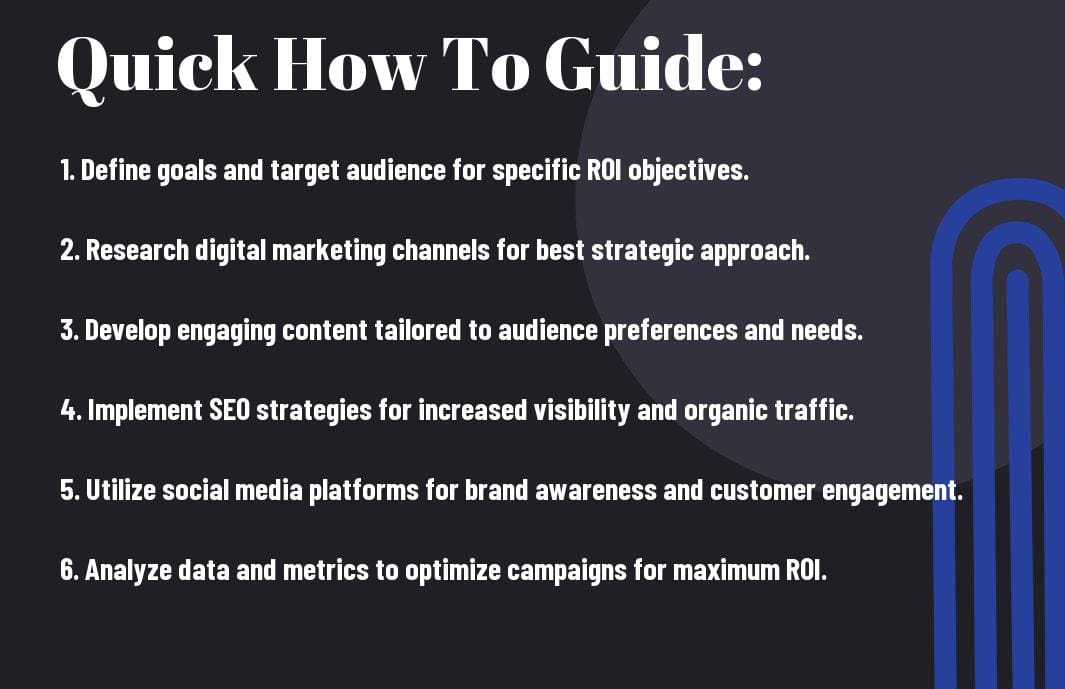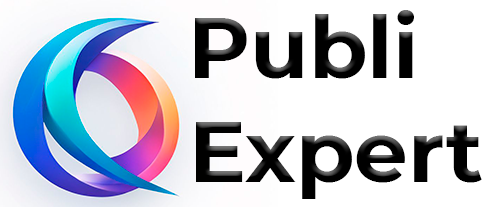In the matter of digital marketing, you need to have a strategic approach to get the maximum ROI for your efforts. In today’s fast-paced online world, knowing how to navigate the digital landscape and make the most of your marketing strategies is crucial for business success. This guide will provide you with the necessary tips and techniques to master digital marketing and optimize your ROI.
Key Takeaways:
- Utilize multiple channels: In order to maximize ROI, it is important to use a variety of digital marketing channels such as social media, email marketing, search engine optimization (SEO), and pay-per-click advertising.
- Set clear goals and KPIs: To measure the success of your digital marketing campaigns, it is crucial to establish clear goals and key performance indicators (KPIs) upfront. This will help you track progress and make necessary adjustments to improve ROI.
- Regularly analyze and optimize: Continuous analysis of your digital marketing campaigns is crucial for improving ROI. By analyzing performance data regularly, you can identify areas for optimization and make changes to ensure maximum effectiveness and profitability.

Understanding Your Audience
The success of any digital marketing strategy lies in understanding your audience. By gaining insights into their demographics, behaviors, and preferences, you can tailor your marketing efforts to effectively reach and engage with them.
Identifying Target Customer Demographics
Some of the key demographic factors to consider when identifying your target customers include age, gender, location, income level, education level, and occupation. Understanding these factors will help you create marketing campaigns that resonate with your target audience.
It is crucial to gather data through market research, surveys, and analysis of your current customer base to accurately define your target customer demographics. Knowing who your target customers are can guide you in creating personalized and targeted marketing messages that are more likely to convert.
Analyzing Customer Behavior and Preferences
There’s no one-size-fits-all solution when it comes to analyzing customer behavior and preferences. It requires a deep understanding of how your audience interacts with your brand, what drives their purchase decisions, and what content resonates with them the most.
Customer behavior can be analyzed through website analytics, social media insights, email marketing metrics, and other tools. By tracking and analyzing customer behavior, you can optimize your digital marketing strategies to deliver the right message, at the right time, through the right channels.
Crafting a Digital Marketing Strategy
Setting Clear Marketing Objectives
The foundation of a successful digital marketing strategy lies in setting clear marketing objectives. Unlike traditional marketing, digital marketing allows for more specific and measurable goals. The objectives you set should be SMART: Specific, Measurable, Achievable, Relevant, and Time-bound. By defining your marketing objectives clearly, you can align your team and resources towards achieving these goals effectively.
Selecting the Right Marketing Channels
The key to a successful digital marketing strategy is selecting the right marketing channels to reach your target audience. Assuming that all channels will deliver the same results can lead to wasted resources and ineffective campaigns. It’s imperative to research and analyze where your audience is most active and tailor your strategy accordingly. Whether it’s social media, email marketing, search engine optimization, or paid advertising, each channel has its strengths and requires a unique approach to drive engagement and conversions.
Marketing channels play a crucial role in reaching your target audience and maximizing your ROI. Each channel has its characteristics and audience demographics, so it’s important to choose the ones that align best with your marketing objectives. By focusing your efforts on the channels where your audience is most active, you can optimize your strategy for better results.
Allocating Budget for Maximum Impact
Impactful digital marketing strategies require a well-thought-out budget allocation to maximize ROI. By analyzing past performance data and setting clear objectives, you can determine the areas where your budget will have the most significant impact. Channels that have shown a higher return on investment should be prioritized, while also considering allocating resources for testing and experimenting with new channels or strategies. Recall, the key is not just spending money but spending it wisely to achieve your marketing objectives efficiently.
Creating Compelling Content
For businesses looking to excel in the digital realm, creating compelling content is key to grabbing and maintaining the attention of their target audience. Whether it’s through blog posts, videos, social media updates, or email newsletters, content marketing plays a crucial role in driving engagement and ultimately, conversions.
How-To: Develop a Content Marketing Plan
For those aiming to develop a successful content marketing strategy, it all begins with a well-thought-out plan. Define your target audience, establish clear goals, and outline the type of content you will create. Consider the platforms where your audience spends the most time, and tailor your content to suit each channel’s unique characteristics. Consistency is key, so create a content calendar to stay organized and ensure a steady flow of compelling content.
Tips for Producing Engaging and Shareable Content
For businesses to stand out in a sea of digital noise, it’s vital to produce content that is not only engaging but also highly shareable. Incorporate visual elements such as images, videos, and infographics to capture your audience’s attention. Craft compelling headlines that entice readers to click and share. Utilize storytelling to create an emotional connection with your audience, making your content more memorable and share-worthy.
- Visual elements like images, videos, and infographics
- Compelling headlines that drive clicks and shares
- Storytelling to create an emotional connection with the audience
Developing an engaging and shareable content strategy requires a deep understanding of your target audience’s preferences and behaviors. Analyze data regularly to determine which types of content resonate the most with your audience and adjust your strategy accordingly. Encourage social sharing by including share buttons on your content and engaging with your audience through comments and messages.
- Analyze data to determine audience preferences
- Include social sharing buttons to encourage sharing
- Engage with the audience through comments and messages
Creating Compelling Content: The Key to Digital Marketing Success
Creating compelling content is the cornerstone of any successful digital marketing strategy. By focusing on producing engaging, shareable content that resonates with your audience, businesses can drive higher levels of engagement and ultimately, achieve a greater return on investment. Be mindful of, quality over quantity is crucial in the digital landscape, so invest the time and resources needed to create content that truly stands out.
Leveraging Search Engine Optimization (SEO)
Now, in the world of digital marketing, mastering Search Engine Optimization (SEO) is crucial for maximizing your online visibility and driving organic traffic to your website. SEO involves optimizing your website and its content to rank higher on search engine result pages (SERPs) for relevant keywords and phrases. By understanding and implementing effective SEO strategies, you can significantly improve your website’s visibility, attract more qualified leads, and ultimately increase your return on investment (ROI).
Factors Affecting SEO Success
While many factors can influence your SEO success, some key ones include
- keyword research
- quality of content
- backlinks
- website speed
- mobile-friendliness
Any successful SEO strategy must take into account these factors and continuously optimize them to stay ahead of the competition.
How-To: Conduct Effective Keyword Research
There’s no denying the importance of conducting thorough keyword research for your SEO efforts. Keywords are the foundation of your SEO strategy, helping you understand what your target audience is searching for online. By leveraging tools like Google Keyword Planner, SEMrush, or Ahrefs, you can identify relevant keywords with high search volume and low competition. This research will enable you to create content that aligns with your audience’s search intent and optimize your website accordingly.
Leveraging effective keyword research can help you identify valuable opportunities for optimization and content creation. By understanding the language and intent behind your target audience’s searches, you can tailor your content to meet their needs and attract more organic traffic to your website. This strategic approach to keyword research will not only improve your search engine rankings but also enhance the overall user experience on your site.
Tips for On-Page and Off-Page Optimization
Effective on-page and off-page optimization are important components of a successful SEO strategy. On-page optimization involves optimizing your website’s content, metadata, and internal linking structure, while off-page optimization focuses on building quality backlinks from authoritative websites. Assume that
- quality content
- relevant keywords
- link-building
are crucial for achieving higher search rankings and driving organic traffic to your site. Any SEO strategy should incorporate both on-page and off-page optimization techniques to improve your website’s visibility and credibility in the eyes of search engines.
Effective on-page optimization involves structuring your website’s content around relevant keywords, optimizing meta titles and descriptions, and improving the overall user experience. Assume that by following best practices for on-page SEO, you can increase your chances of ranking higher in search results and attracting more organic traffic to your site. Off-page optimization, on the other hand, focuses on building quality backlinks from reputable websites to establish your site’s authority and credibility in the eyes of search engines. By implementing a well-rounded SEO strategy that incorporates both on-page and off-page optimization techniques, you can maximize your online visibility and drive sustainable organic traffic to your website.
Mastering Social Media Marketing
After reading about How to Improve ROI In Digital Marketing, it’s time to investigate into mastering social media marketing for maximum ROI. Social media platforms have become crucial tools for digital marketers looking to engage with their audience, drive traffic to their websites, and increase brand awareness.
Choosing the Right Platforms for Your Brand
Media platforms play a critical role in your social media marketing strategy. It’s crucial to identify the platforms where your target audience is most active. Conduct research to understand which platforms align best with your brand’s goals and values. Whether it’s Facebook, Instagram, Twitter, or LinkedIn, selecting the right platforms will focus your efforts and resources for better results.
Tips for Building an Engaging Social Media Presence
Platforms thrive on engaging content that resonates with the audience. To build a strong social media presence, focus on creating high-quality visuals, compelling copy, and interactive elements that encourage audience participation. Establish a consistent posting schedule to maintain visibility and engage with your followers to foster a sense of community. Recognizing the nuances of each platform and tailoring your content accordingly can significantly impact engagement levels.
How-To: Create Social Media Campaigns that Convert
While social media marketing is great for brand awareness, your ultimate goal is to convert followers into customers. Your social media campaigns should be strategic and purposeful, with a focus on driving conversions. Utilize targeted ads, compelling calls-to-action, and unique selling propositions to entice your audience to take action. Establish clear goals, track key metrics, and optimize your campaigns based on performance data. Recognizing what resonates with your audience and adapting your strategy accordingly will help you create campaigns that drive results.
Utilizing Pay-Per-Click (PPC) Advertising
Once again, in the landscape of digital marketing, Pay-Per-Click (PPC) advertising remains a powerful tool for businesses to drive targeted traffic to their websites. By leveraging platforms like Google Ads and social media advertising, businesses can reach potential customers at the precise moment they are searching for products or services relevant to their offerings. To maximize ROI, it is crucial to master the art of setting up effective PPC campaigns, writing compelling ad copy, and improving click-through rates and quality scores.
How-To: Set Up a PPC Campaign
Setting up a successful PPC campaign involves several key steps. Firstly, define your campaign goals and target audience. Conduct thorough keyword research to identify relevant search terms that align with your business objectives. Create compelling ad creatives with clear calls-to-action and relevant landing pages to enhance user experience and drive conversions. Continuously monitor and optimize your campaigns based on performance data to ensure maximum ROI.
Tips for Writing Effective Ad Copy
Advertising on PPC platforms requires writing compelling ad copy that resonates with your target audience. Use relevant keywords strategically in your headlines and ad descriptions to improve visibility and relevance. Highlight unique selling points and benefits to differentiate your ads from competitors. Include a strong call-to-action to prompt users to click on your ad. Perceiving ad copy as a tool to engage and convert customers can significantly impact the success of your PPC campaigns.
With ad copy being the first point of contact between your business and potential customers, it’s vital to craft messages that capture attention and drive action. By using compelling language, emphasizing value propositions, and incorporating persuasive elements, businesses can increase click-through rates and ultimately achieve their PPC advertising goals.
Factors for Improving Click-Through Rates and Quality Scores
You can enhance your PPC performance by focusing on factors that impact click-through rates and quality scores. Utilizing relevant keywords in ad copy and landing pages can improve ad relevance and quality scores, leading to higher ad placements and lower costs per click. Enhancing user experience through optimized landing pages and fast loading times can also boost click-through rates and ultimately drive conversions. Recognizing the importance of ad relevance and user experience is crucial for achieving success in PPC advertising.
Measuring and Analyzing Results
Not only does digital marketing allow for precise targeting and real-time engagement with customers, but it also provides invaluable data that can be used to measure and analyze the success of your strategies. By carefully monitoring key performance indicators (KPIs) and other metrics, you can gain insights into what is working well and where adjustments are needed to maximize return on investment (ROI).
Setting Up Analytics Tools
Results are only as good as the tools you use to measure them. Setting up analytics tools such as Google Analytics, Adobe Analytics, or even social media platform insights is crucial for tracking the performance of your digital marketing campaigns. These tools provide you with a wealth of data on website traffic, user behavior, conversions, and more, allowing you to make informed decisions based on real-time data.
How-To: Track Key Performance Indicators (KPIs)
With the multitude of data available through analytics tools, it’s important to focus on tracking the key performance indicators (KPIs) that align with your business goals. These KPIs can vary depending on the nature of your business and your specific objectives, but common metrics to track include website traffic, conversion rates, click-through rates, and return on investment (ROI).
This level of tracking allows you to assess the effectiveness of your digital marketing efforts and make data-driven decisions to optimize your campaigns for better results.
Utilizing Data to Refine Marketing Strategies
Refine your digital marketing strategies by utilizing the wealth of data at your disposal. Analyzing the results from your analytics tools and KPI tracking can provide valuable insights into consumer behavior, preferences, and trends. By understanding this data, you can refine your target audience, messaging, and channels to better engage with customers and drive conversions.
This iterative process of analyzing data and refining strategies based on the indicators of success is crucial for staying ahead in the ever-evolving digital marketing landscape.
Conclusion
As a reminder, mastering digital marketing strategies for maximum ROI requires a comprehensive approach that involves setting clear goals, understanding your target audience, and leveraging data for continuous optimization. By implementing various digital marketing techniques such as SEO, social media marketing, and email campaigns, businesses can increase their online presence and drive conversions effectively. For more insights on how to improve your digital marketing ROI, check out Digital Marketing ROI: Metrics & Tips to Increase It.
FAQ
Q: What is the significance of digital marketing strategies for businesses?
A: Digital marketing strategies are crucial for businesses as they allow for precise targeting, better engagement with the target audience, and increased ROI through cost-effective campaigns.
Q: How can businesses determine the right digital marketing strategies for their goals?
A: Businesses can determine the right digital marketing strategies by conducting a thorough analysis of their target audience, industry trends, competitors, and setting clear and measurable goals.
Q: What are some necessary components of an effective digital marketing strategy?
A: Some necessary components of an effective digital marketing strategy include SEO, content marketing, social media marketing, email marketing, and data analytics for performance tracking and optimization.
Q: How can businesses maximize their ROI through digital marketing strategies?
A: Businesses can maximize their ROI through digital marketing strategies by continuously optimizing campaigns based on data insights, focusing on relevant KPIs, testing different approaches, and adapting to changes in the digital landscape.
Q: What role does content marketing play in a successful digital marketing strategy?
A: Content marketing plays a crucial role in a successful digital marketing strategy by attracting and engaging the target audience, building brand credibility, and driving conversions through valuable and relevant content.
Q: How important is social media marketing in a comprehensive digital marketing strategy?
A: Social media marketing is necessary in a comprehensive digital marketing strategy as it allows businesses to connect with their audience, build brand awareness, drive website traffic, and foster customer relationships through engaging content and interactions.
Q: What are some tips for businesses looking to improve their digital marketing strategies for better ROI?
A: Some tips for businesses looking to improve their digital marketing strategies for better ROI include staying updated on industry trends, leveraging data analytics for insights, testing and optimizing campaigns regularly, and investing in employee training for digital marketing skills.




